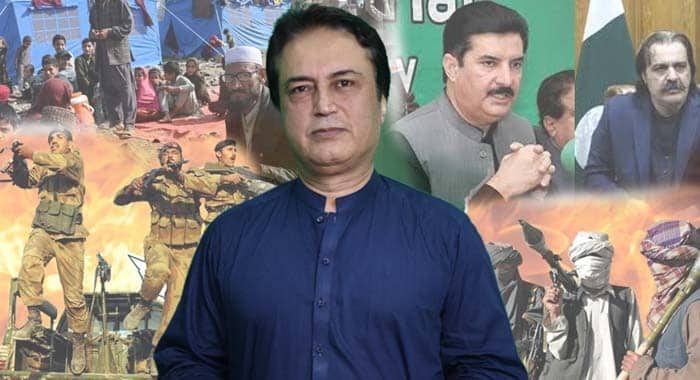The Counter-Terrorism Department’s latest figures for Khyber Pakhtunkhwa are grim. Between 1 January and 31 August 2025, there had been 766 terror attacks across the province, leaving over 400 police officers, security personnel and civilians martyred and more than 900 injured. The CTD reports that its own actions neutralized 293 militants and resulted in 878 arrests, yet the trajectory of violence continues upward.
Even the proscribed Tehreek-e-Taliban Pakistan (TTP) trumpets alarming numbers. For August 2025 alone, its propaganda channels boasted over 550 attacks and roughly 1,400 casualties. Whatever the precise accuracy, the trend line is clear: the bloodletting is accelerating.
A “Full-Fledged War” in the South
From Dera Ismail Khan through the merged tribal districts, KP now faces what can only be described as an undeclared war. Intelligence-based operations target TTP hideouts almost daily, while retaliatory ambushes, bombings and assassinations plague police outposts. The militants’ “Al-Khandaq” campaign has raised both tempo and sophistication of attacks.
Yet despite this reality, the civilian leadership projects only confusion. Chief Minister Ali Amin Gandapur and Governor Faisal Karim Kundi preside over a province where terror strikes peak precisely in the political heartland of Dera Ismail Khan. Hand-wringing statements and closed-door assurances substitute for a coherent counter-terror strategy.
Empty Rhetoric, Fractured Will
Pakistan’s political class habitually insists, behind conference-room doors, that it stands united against militancy. Outside those rooms, it dissembles. Handouts trumpet “full resolve” while practical backing for security forces evaporates. Worse, allegations persist; voiced even within apex committee meetings, that provincial figures placate extremists with cash “donations” rather than dismantle their networks. Such appeasement, real or perceived, corrodes public faith and emboldens enemies.
For over two decades, successive governments; MMA, ANP, PPP, PML-N and most recently PTI, have promised reform. None have delivered sustained stability. Instead, they prioritize parliamentary arithmetic, back-channel deal-making and preservation of personal fiefdoms. Words flow freely; action remains cosmetic.
Lessons Unlearned
Afghanistan stands as a cautionary tale. The United States and a coalition of 60-plus nations deployed cutting-edge weaponry for twenty years, only to accept in Doha what arms alone could not achieve: a negotiated exit. Pakistan cannot assume brute force will succeed where superpowers failed. If dialogue can credibly dismantle TTP structures, it deserves serious exploration; yet dialogue requires unity of purpose, clear preconditions and political ownership. On each count, KP’s government falters.
Governance Failure Runs Deeper Than Terror
Militancy is only one symptom of a deeper malaise: systemic misgovernance. Corruption scandals recycle with every electoral cycle; patronage replaces policy; merit bows before political loyalty. Contradictions abound: one minister signals mass deportations of Afghan refugees while another hints at leniency. Such incoherence fuels cynicism and alienates the very communities whose cooperation is vital to defeating extremism.
Public trust has eroded to the point of near collapse. Citizens witness “accountability” dramas that punish no one of consequence, see elites prosper through graft, and conclude that self-interest, not service, drives the ruling class. In that vacuum, militant narratives find oxygen.
A Call for Structural Change
Pakistan’s governance model, ossified since the late 1980s, has failed KP most acutely. Piecemeal tinkering will not suffice. The province: and by extension the federation; needs a grand national dialogue that includes political parties, civil society, the military, and yes, independent journalists who have long borne the brunt of intimidation for speaking inconvenient truths.
Key reforms are imperative:
Unified Counter-Terror Policy: Stop the whiplash of “talk today, fight tomorrow.” Decide collectively and transparently.
Depoliticized Policing: Shield law enforcement from party patronage; resource it adequately.
Accountability Beyond Optics: Demonstrate that graft invites swift, impartial punishment, no matter the surname.
Civic Inclusion: Engage tribal elders, religious scholars, women’s groups and youth in de-radicalization and local dispute resolution.
Absent such reforms, KP will remain trapped in an endless loop of “operations” that clear valleys for months but never win peace for generations.
Terrorism thrives where governance fails. Khyber Pakhtunkhwa’s mounting death toll is not merely a security lapse; it is the bill for decades of political negligence. If KP’s leaders cannot align words with deeds, history will record their tenure as one of squandered opportunities, and an avoidable continuation of war on Pakistan’s own soil.





